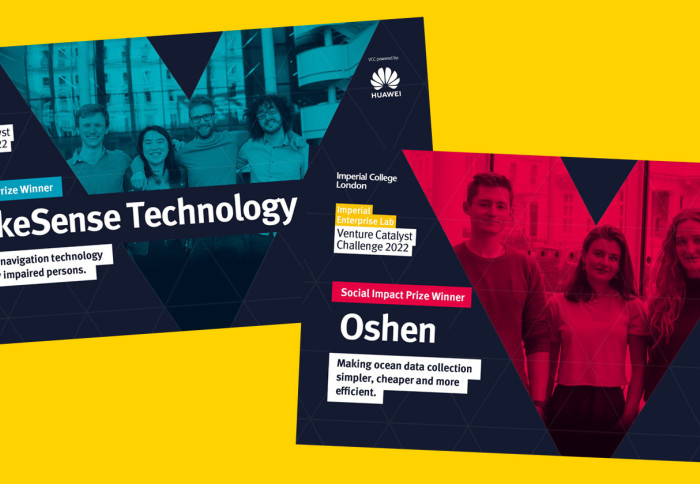Start-ups win big at the 2022 Venture Catalyst Challenge
by Jane Horrell

Two EEE-linked ventures have been awarded £10,000 to develop their innovations at Imperial's largest student and alumni entrepreneurship competition.
After weeks of masterclasses, coaching, and meetings with experts, 25 teams pitched to expert panels at the heats, before 5 teams battled it out at last Friday's final.
Two of the final 25 groups — both with an EEE connection — were awarded the competition's special £10,000 prizes to develop their innovations. Congratulations to Oshen and MakeSense!
The Social Impact Prize was awarded to Oshen for their work developing a small sailboat designed for long, fully autonomous passages in harsh marine environments.
The Moonshot Prize was awarded to MakeSense for challenging the status quo and pushing boundaries with their innovative technology for visually impaired people.
Oshen: Ciaran Dowds, final year undergraduate
"Oshen are building an autonomous sailboat to collect ocean data. Our boat is designed to be small and low cost, but incredibly robust to harsh ocean conditions. Carrying a sensor payload powered by solar energy, our vessel will sail itself to an area of interest to collect and transmit ocean data. This innovation will remove the expense of chartering a research vessel to deliver sensors to remote areas of the ocean. In the future we envision operating a fleet of autonomous boats, acting as platforms for multiple different sensors. Use cases include measuring the effects of climate change, detecting pollution, monitoring marine life, and reporting real-time sea conditions. Initially, we aim to demonstrate our technology by becoming the first ever team to complete the Microtransat Challenge and cross the Atlantic completely autonomously
 The team is led by Imperial Aeronautical Engineering student Anahita Laverack, who is working on the navigation control system as her final year project. Electrical and Electronic Engineering student Ciaran Dowds is responsible for the electronics and power systems and Durham University graduate Kate Pesenti manages marketing and communications.
The team is led by Imperial Aeronautical Engineering student Anahita Laverack, who is working on the navigation control system as her final year project. Electrical and Electronic Engineering student Ciaran Dowds is responsible for the electronics and power systems and Durham University graduate Kate Pesenti manages marketing and communications.
 So far we have created a prototype which we have been testing at a London reservoir. Our next step is to take the prototype through more intense sea testing. Throughout the summer we will use our testing results to refine our initial design: we then plan to manufacture a small fleet of three boats to set sail across the Atlantic in September.
So far we have created a prototype which we have been testing at a London reservoir. Our next step is to take the prototype through more intense sea testing. Throughout the summer we will use our testing results to refine our initial design: we then plan to manufacture a small fleet of three boats to set sail across the Atlantic in September.
We were delighted to win the Social Impact Prize and we would like to thank the Enterprise Lab staff and all of the coaches and subject-experts who guided us throughout the programme. We learned so much being part of the VCC and we encourage students to get involved next year.
The VCC prize is a huge kickstart to our fundraising journey, but we still need to raise further investment and sponsorship to carry out our full production and testing plan. We would be very grateful for any advice or support the Imperial community may be able to offer as we work on this ambitious and exciting project."
Contact Oshen and follow their progress on LinkedIn | Twitter | Instagram
MakeSense: Dr Ad Spiers, Lecturer
 The Moonshot Prize is awarded to startup companies that 'challenge the norm, break boundaries and push innovation to the limit.' MakeSense Technology is a startup directly associated with Dr Spiers' Manipulation and Touch Lab (MTL) in the Department of Electrical and Electronic Engineering. The founder of the company is Mechanical Engineering alumnus Dr Robert Quinn — a visiting researcher in MTL — and the rest of the team are Harry de Winton, Linda Wen and Mark Baxter.
The Moonshot Prize is awarded to startup companies that 'challenge the norm, break boundaries and push innovation to the limit.' MakeSense Technology is a startup directly associated with Dr Spiers' Manipulation and Touch Lab (MTL) in the Department of Electrical and Electronic Engineering. The founder of the company is Mechanical Engineering alumnus Dr Robert Quinn — a visiting researcher in MTL — and the rest of the team are Harry de Winton, Linda Wen and Mark Baxter.
Receiving the news last week, Ad said:
"MakeSense is delighted to win the VCC Moonshot prize, as our whole motivation is certainly a moonshot — our goal is to develop technology to improve independence vision impaired people around the world.
At present we can't say too much about our technology except that it is based around cutting edge haptics, computer vision and LIDAR. We are planning some participant studies in the near future to test the systems that that we have developed."
We are looking forward to learning more about this potentially very exciting technology, and you can follow MakeSense on Twitter to get the latest updates.
Article text (excluding photos or graphics) © Imperial College London.
Photos and graphics subject to third party copyright used with permission or © Imperial College London.
Reporter
Jane Horrell
Department of Electrical and Electronic Engineering